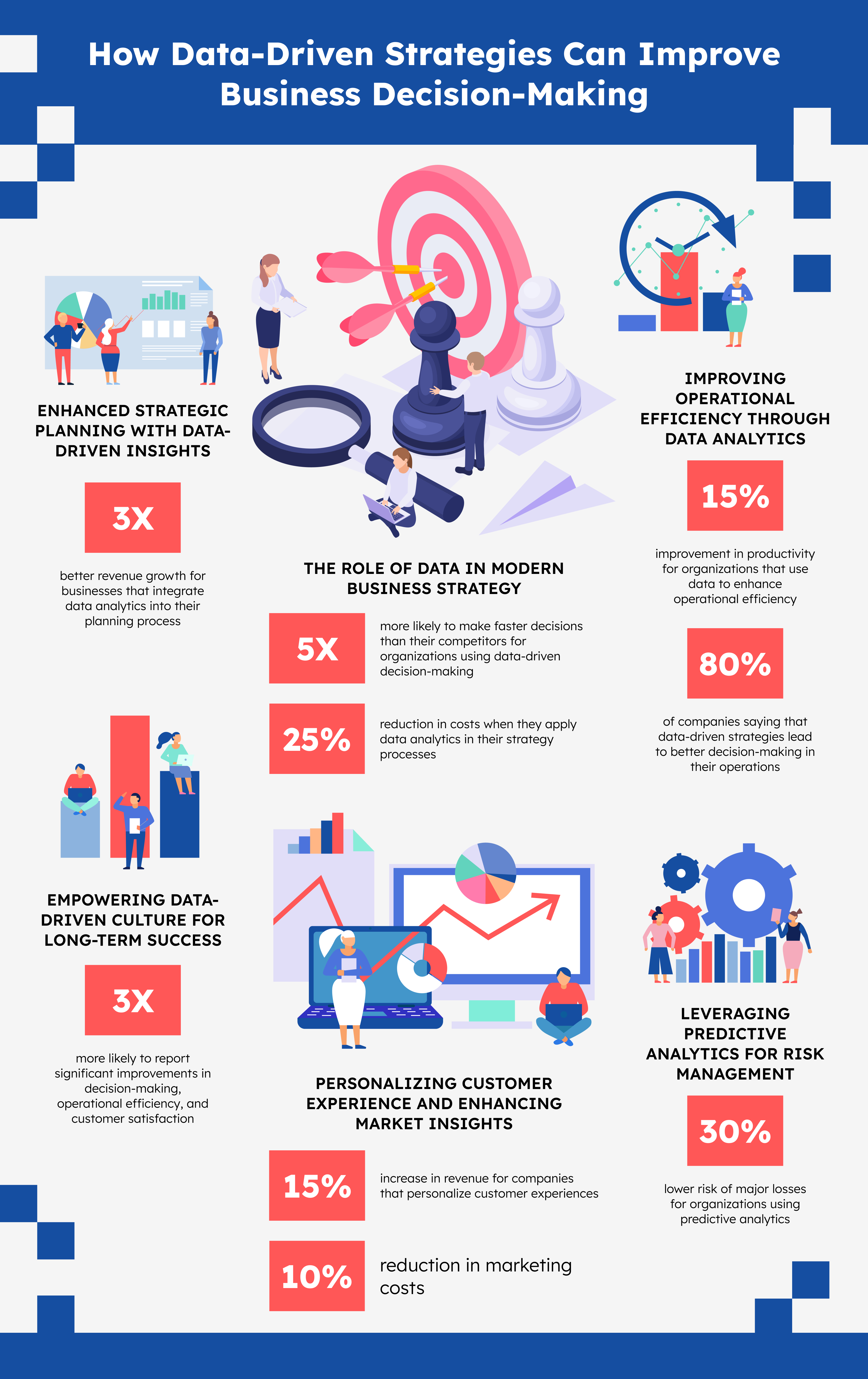In the digital age, businesses are under constant pressure to adapt quickly and make decisions based on real-time information. The key to staying ahead? Leveraging data. Companies are increasingly turning to data-driven strategies to fuel smarter decision-making, improve operational efficiencies, and create a competitive advantage. Data analytics, an integral part of modern management consulting, helps businesses achieve precise, actionable insights that not only guide strategic planning but also enhance long-term business performance.
In this article, we’ll explore how data analytics transforms management consulting and empowers businesses to optimize decision-making across all levels.


1. The Role of Data in Modern Business Strategy
Effective decision-making lies at the heart of every successful business. With data analytics, companies can make decisions based on factual insights rather than relying on gut instinct. Market trends, customer behavior, and internal performance metrics provide a 360-degree view that helps businesses spot growth opportunities and minimize risks.
Why it matters:
Incorporating data analytics into business strategies allows companies to become more agile, adapting swiftly to market changes. Studies show that organizations using data-driven decision-making are 5 times more likely to make faster decisions than their competitors. They also report a 10% increase in revenue and a 25% reduction in costs when they apply data analytics in their strategy processes1. This combination of speed and cost-efficiency gives businesses the confidence to navigate volatile markets and stay ahead of competitors.
2. Enhanced Strategic Planning with Data-Driven Insights
Strategic planning involves forecasting, goal-setting, and resource allocation. Data-driven insights refine this process by providing businesses with predictive analytics and deep insights into emerging trends, customer needs, and potential obstacles. By examining historical data, companies can forecast demand, allocate resources effectively, and set achievable goals.
Why it matters:
According to a recent survey, 63% of high-performing companies say they use data-driven insights to inform their long-term strategy. Moreover, businesses that integrate data analytics into their planning process achieve 3 times better revenue growth than those that don’t2. This capability enables businesses to proactively adjust to changing conditions and remain competitive.
3. Improving Operational Efficiency Through Data Analytics
Data analytics also plays a pivotal role in streamlining business operations. By evaluating workflows, identifying inefficiencies, and proposing improvements, management consultants can help businesses optimize processes. Analytics tools uncover bottlenecks, resource misallocations, and other inefficiencies, enabling organizations to improve productivity while reducing costs.
Why it matters:
Organizations that use data to enhance operational efficiency report a 15% improvement in productivity, with 80% of companies saying that data-driven strategies lead to better decision-making in their operations3. By focusing on operational improvements, companies can reinvest resources into growth areas, fostering long-term sustainability.
4. Leveraging Predictive Analytics for Risk Management
Risk management is a crucial element of any business strategy, and predictive analytics offers foresight into potential disruptions. By analyzing patterns from historical data, companies can anticipate risks like financial downturns or supply chain disruptions and develop contingency plans.
Why it matters:
Predictive analytics in risk management can significantly reduce potential losses. Research shows that organizations using predictive analytics to mitigate risk have a 30% lower risk of major losses4. For example, predictive models can identify potential disruptions in the supply chain, enabling businesses to secure alternative suppliers and minimize operational impacts.
5. Personalizing Customer Experience and Enhancing Market Insights
Customer experience is now a central driver of business growth. Data analytics allows companies to understand customer behaviors at a granular level, which helps tailor products, services, and marketing strategies to meet specific needs. Management consultants use these insights to help businesses foster deeper customer relationships and increase loyalty.
Why it matters:
According to McKinsey, companies that personalize customer experiences report a 15% increase in revenue and a 10% reduction in marketing costs5. By understanding customer preferences through data, businesses can deliver more relevant experiences that improve retention and boost lifetime customer value.
6. Empowering Data-Driven Culture for Long-Term Success
Creating a data-driven culture is essential for businesses to maximize the benefits of data analytics. When every employee, from top management to entry-level staff, relies on data to make decisions, the entire organization becomes more efficient and aligned with business goals. Management consultants help businesses establish frameworks that foster a data-driven mindset across all levels.
Why it matters:
Companies with a strong data-driven culture are 3 times more likely to report significant improvements in decision-making, operational efficiency, and customer satisfaction6. A commitment to data at every level ensures consistency in decision-making and a unified approach to achieving organizational success.

How Xerosoft Global Supports Data-Driven Decision-Making
At Xerosoft Global, we understand the transformative power of data-driven strategies in today’s fast-paced business environment. Our management consulting services are designed to help companies incorporate data analytics into their decision-making processes, driving smarter, more efficient, and forward-looking decisions.
Our services include:
- Strategic Data Analytics: Tailored insights to identify growth opportunities and risks, informing data-driven strategies.
- Operational Optimization: Improving workflows and reducing costs by leveraging data to evaluate and enhance processes.
- Risk Management and Predictive Analysis: Helping companies predict and manage risks through the power of data analytics.
- Customer Insights and Personalization: Using data to improve customer engagement and increase brand loyalty.
Conclusion
In an increasingly complex business world, data-driven strategies are not just a competitive advantage—they’re a necessity. By leveraging data analytics, businesses can make faster, more informed decisions that lead to improved strategic outcomes, operational efficiencies, and better customer experiences. At Xerosoft Global, we partner with organizations to integrate data analytics into their decision-making processes, ensuring long-term success and sustained growth.
References
- “The 2019 Data-Driven Enterprise: The Path to Business Value,” Forbes Insights, 2019.
- “How Companies Use Data to Drive Strategic Planning,” Harvard Business Review, 2020.
- “Data-Driven Operations: A Competitive Advantage,” McKinsey & Company, 2021.
- “Predictive Analytics in Risk Management,” Deloitte Insights, 2022.
- “Personalized Customer Experience and ROI,” McKinsey, 2021.
- “The Impact of Data-Driven Culture,” PwC, 2022.

